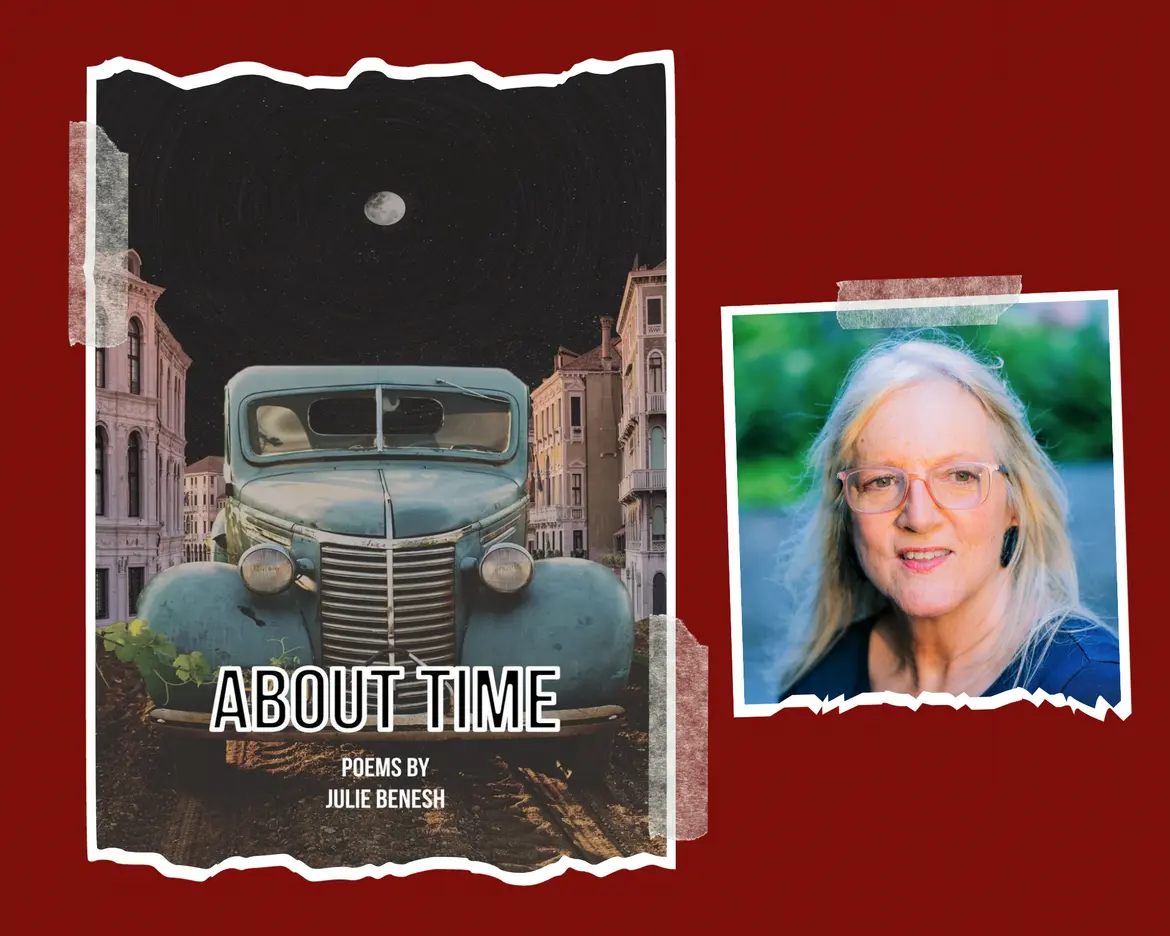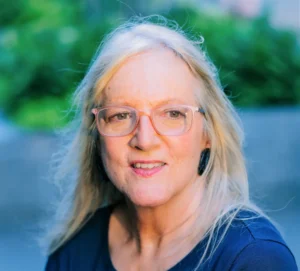In Julie Benesh’s About Time, a memoir in poems, there is well-disguised tension.

In This LitStack Review of About Time
Julie Benesh’s About Time: A Memoir in Poems
There is well-disguised tension in Julie Benesh’s chapbook, About Time, a memoir in poems. Humor, wordplay, and a playful tone belie the collection’s preoccupations with loss, regret, and the anticipation of death. Benesh deals with past romantic relationships and the memory of her parents using an overarching organizing principle of time, as indicated by the title: the movement is from present to past to deeper past. But Benesh takes us on a journey that is not so much chronological as thematic, conveying memories of relationships, for example, then guiding us into memories of her parents. Throughout the memoir, however, the speaker’s awareness of death, her memory of her mother’s death and her anticipation of her own, is ever present.
(Cathexis Northwest Press, November 2022. 66 pages)
Together But Indisputably Alone
Tension created by using a light tone to relate painful material assures that there is no chance of sentimentality in Benesh’s poems. Here’s her treatment of isolation within a relationship: “we live together but are, indisputably, / alone and a wavicle is just a cute nickname for a photon: / wave plus particle (sitting in a tree?).” Similarly, in the skillfully wrought “Divorce Casserole,” the poet uses commands and the diction of a recipe to convey the excruciating experience of a contentious divorce: “Blanche when you get / served: you didn’t see it coming: he’s already / sampled every lawyer in town, leaving none for you.” The contrast between tone and content heightens the embedded sorrow but avoids melodrama.
There are also poems that recount the more innocent relationships before marriage (“Three Dates with Harry Chapin: Story Songs”). And “Since You’ve Been Gone,” a direct address to the speaker’s ex, testifies to the speaker’s resilience in moving past her divorce:
You thought I would starve or, at best
find a sugar daddy to feed me ribeye
and frozen custard. But as I said at the time
that’s too easy. You know me: gotta do it my own way.
“Since You’ve Been Gone,” Julie Benesh
This speaker is a woman determined to remember her past romantic ties and to demonstrate her strength in moving past the loss of them.
Killer Breasts
This is also a speaker who contemplates her origins. The inevitability of her own death is tied, in “It’s October,” to the death of her mother: “It’s the October of my life, mathematically, actuarially: my mother died in her own October.” In this poem and in the series of poems concerning her parents that follow, we learn about the mother’s “cleaning lady bruises,” her “killer breasts (which would eventually kill her)” (“Lookers”), about the father’s alcoholism (“The Inheritance”). Benesh’s parents’ aspirations paint a portrait: “She wanted me to be a boss and mistress of myself. He wanted me to join the army … A half century later they are both not not right.”
With her characteristic playful tone, this poet evokes, in “Facts,” the memory of a beloved and long-deceased mother with humor:
She taught me to fasten my boulder
holder the easy way, like they never
do in the movies: backwards, clasps
in front, pull it around, straps
up, no reaching around my back.
“Facts” Julie Benesh
This poet conjures her parents by means of such details. The prosy quality of her lines, the tone, the comic touches create a sense of panorama in the depiction of these characters. The warmth, the conflict, the love in these relationships is evident but presented as if from a great emotional distance. The risk of sentimentality in the evocation of the speaker’s parents is non-existent.
Morphine Fiend
Death is ever-present in this collection: in the first three poems, in “Corpse Pose” a yoga pose that certainly evokes death. One particularly powerful image of death appears twice, as if for emphasis, in “Afterlife” and in “Hospice.”
I want to die
a morphine fiend,
like my M-browed
tabby, Mandy. I made
a tent of striped fur, shot
her up: read her love
poems; sang lullabies.
She danced and chirped
her gratitude. No
Chemo—
(o, Mother!)
therapy.
“Afterlife” and “Hospice” by Julie Benesh
In these lines about the end of a pet’s life, Benesh dares to suggest the fullness of her love. The reference to her mother reveals the raw emotional impact of the way her mother died. Here, Benesh is truly at her best.
Regarding craft, Benesh often employs alliteration, internal rhyme, and wordplay. In “Girlwor[l]d,” Benesh finds a dizzying number of rhymes for “girl.” Still, despite the manic rhyming, death comes at the end of the poem: “before the burn / and urn.” Benesh sometimes uses wordplay to great effect, as in “Spare,” where “organ recital” appears to refer to a musical performance but actually evokes a list of maladies. The heightened diction and medical language couch anxiety in Benesh’s characteristic humor:
I want to know how not to be
ashamed of my panicula
my varicosities and lipid count
how not to trigger a spiral
into worseness unto aboulia.
“Girlwor[l]d,” by Julie Benesh
This is a poet who is attentive to the effects of language.
Wind Blows the Calendar Pages and Clocks Run Down
Time is the organizing principle of About Time. The theme of time bookends the collection. It is foregrounded in the first poem, “Standard Time,” about the passage of time as measured by holidays, and it is referred to again very near the end of the collection in “The Poem Everyone Writes,” which makes clear that time’s passage affects us all. The contrast between the often humorous tone and the deeply felt sorrow about lost love (romantic and maternal) functions as a fortress against sentimentality. The poems in About Time dive through Benesh’s emotional past to create a compelling memoir that invites us not only to perceive Benesh’s experience but to consider our own.
~ Kathy Nelson
About The Poet Julie Benesh
Julie Benesh is author of the chapbook About Time. Her debut full-length poetry collection, Initial Conditions, is forthcoming from Saddle Road Press in 2024. Julie has been published in Tin House Magazine, Bestial Noise: A Tin House Fiction Reader, Another Chicago Magazine, Crab Orchard Review, Florida Review, and many other places. She earned an MFA from The Program for Writers at Warren Wilson College and has received an Illinois Arts Council Grant. Julie teaches writing craft workshops at the Newberry Library in Chicago and enjoys a more than full-time career as a professor, department chair, and management consultant. Read more at juliebenesh.com.
About Our Guest Reviewer, Kathy Nelson
Kathy Nelson is the author of the full-length collection, The Ledger of Mistakes (Terrapin Books, 2023), as well as two chapbooks: Cattails (Main Street Rag, 2013) and Whose Names Have Slipped Away (Finishing Line Press, 2017). Her poems have appeared in Asheville Poetry Review, Southern Poetry Review, Tar River Poetry, Valparaiso Poetry Review, New Ohio Review, Rogue Agent Journal and elsewhere. She holds an MFA from the Warren Wilson Program for Writers. Read more at https://kathynelsonpoet.com/
Other LitStack Resources
Be sure and check out other LitStack poetry reviews, as well as Michael Collins’ recent review of Kathy Nelson’s Ledger of Mistakes.
As a Bookshop, Amazon affiliate, LitStack may earn a commission at no cost to you when you purchase products through our affiliate links.



